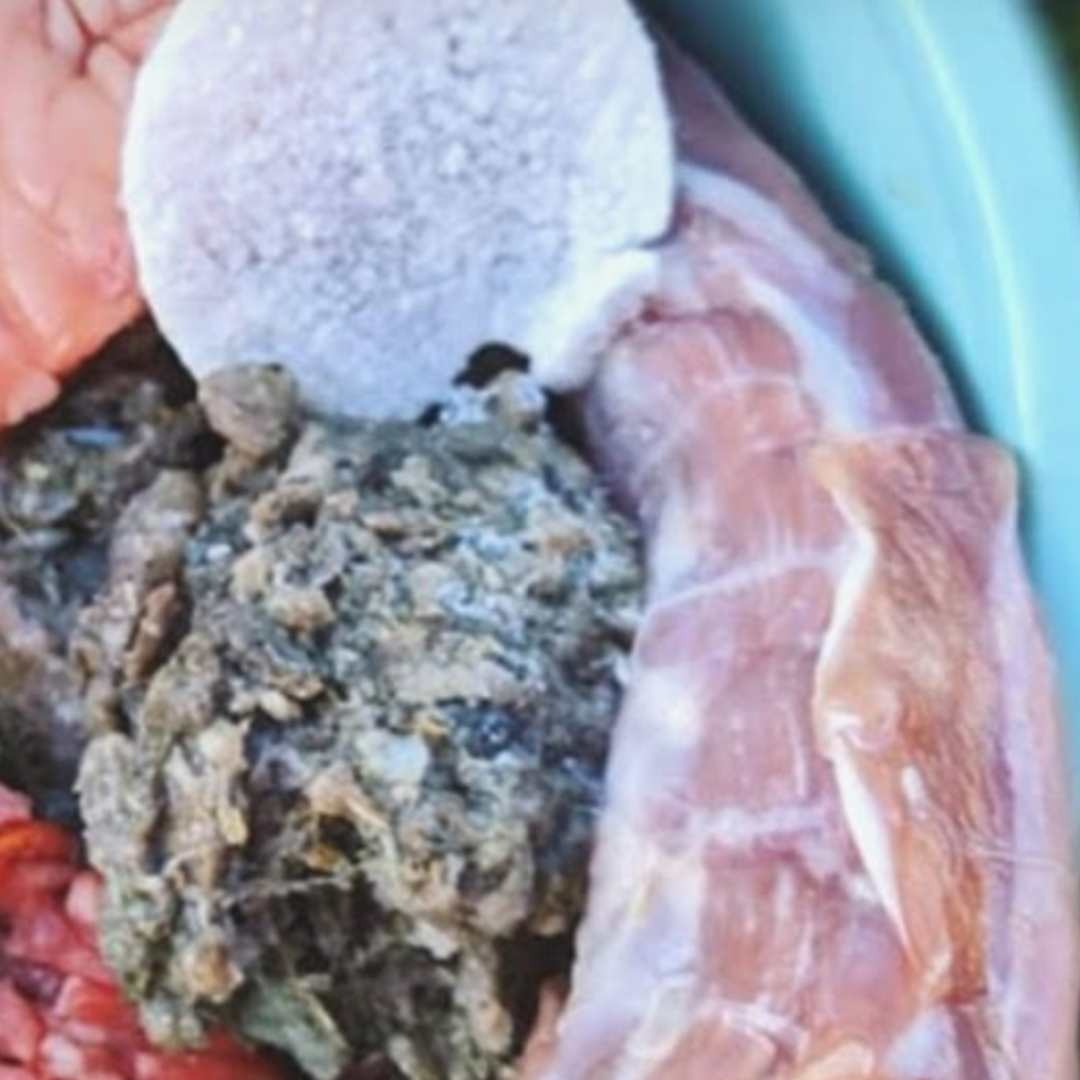Understanding fat, protein, and carbohydrates is a foundational step as we learn how to put together nutritionally complete homemade dog food.
The macronutrient goals we set for our individual dogs is a key organizing principle to build homemade dog food recipes for your dog.
In any dog food recipe for homemade food - whether you're prepping raw dog food or home-cooked dog food - these are the umbrella food groups of canine nutrition giving you multiple options to meet your dog's specific nutritional needs.
(If you'd like to watch me talk through all the details of understanding macronutrients, you can see this guide's accompanying video below.)
Your Dog's Plan
Stop! Don't read this long article. Instead, get everything you need to know, including all advice on Homecooking Basics, in a customizable step-by-step plan for your dog created by our community of certified trainers and nutritionists.
The role of macronutrients in your dog's diet
Macronutrients bring energy (calories) and they also bring nutrients to a well-balanced diet.
Pro tip: Each macronutrient has a set number of calories per gram
A key fact to know and keep in mind as you create your homemade diets and choose ingredients is that fat provides the most energy per gram at 9 calories, while protein and carbohydrates both provide 4 calories per gram (assuming they come from fresh food).
Before we dive into macronutrients and how you can use them in balancing your dog's food, let's review the meaning of a few key acronyms dog owners often ask me about that tend to pop up in our conversations about making homemade dog food:
- RA - Recommended Allowance: the nutritional standard for what dogs need on a daily basis. (RA is a different standard from the MR)
- MR - Minimum Requirement: the standard for the bare minimum of what dogs need.
- SUL - Safe Upper Limit: we'll be talking about the SUL - the safe amount of a nutrient that you don't want to exceed. Some are acute and some are set more for building over the long term. Not every nutrient has a safe upper limit; most don't but we'll talk about that and points of awareness.
- NRC - the National Research Council: when we refer to the NRC requirements for a complete and balanced diet, we're talking about the National Research Council's guidelines for minimum requirements for nutrients and vitamins dogs need. We sometimes note AAFCO or FEDIAF (for the European pet industry) guidelines but usually NRC.
- DMB - Dry Matter Basis: what we use in talking about food nutrients that takes out the moisture factor to create a more even basis of comparison. For example, if we're comparing kibble to a chicken breast to measure the amount of nutrients in each, we'll want to compare on a DMB because the numbers are quite different when the moisture content is included - the same with cooked weights vs raw in homemade food. Also, DMB can be really useful when looking at fiber content.
The 3 macronutrients: protein, fat, & carbohydrates
Let's break down each one for a quick, closer look...
Fats in your dog's diet
Fat can be extremely useful in a dog's diet for high-energy, high-activity dogs. Fats are also required in all dogs' diets for absorbing fat soluble vitamins such as A, D, E, and K.
The category can be broken down further to either unsaturated fatty acids or saturated fatty acids. People often get confused about saturated and unsaturated fats - what they are, what's the difference, etc.
Okay, but tell me more...
Monounsaturated fats and polyunsaturated fats include what are usually thought of as the "good fats" (think salmon, avocado, olive oil, certain seeds & nuts, etc). What defines the two types of fats is rather complex and technical, but thankfully, fulfilling your dog's requirements of needed fats/fatty acids is not.
We'll be talking in more depth about essential fatty acids omega-6 and the harder-to-find-in-foods, super beneficial omega-3 in the next step-by-step guide.
Because fat is the macronutrient highest in energy/calories per gram, balancing the fat level in your dog's diet is a great opportunity to manage your dog's weight to keep your dog at his or her ideal, healthy weight.
Homecooking Basics
Interested in Homecooking Basics? Follow topics you're interested in to customize your dog’s step-by-step plan so it's most helpful and tailored to your dog when you're ready to get started.
Protein in your dog's diet
As a certified pet nutritionist, I might talk about grams of protein needed and often say a dog needs x grams of protein, but what we really have to make sure is that we're including all the amino acids needed within the protein.
Amino acids, both essential and non-essential, are responsible for making just about everything in the body work. It's possible to meet your recommended amounts for protein in a diet but be deficient in your individual necessary amino acids. That's why we calculate all the nutrients separately that make up our macronutrients.
The great news is it's usually very easy to meet all the amino acid recommended allowances with an animal-based homemade diet. We'll talk more about specific nutrients and ways to meet them in your own dog's homemade diet as we get into the process of formulation.
Carbohydrates in your dog's diet
Then we have carbohydrate content. Carbohydrates can be broken down in several different ways but I've simplified it for our canine nutrition objectives.
While dogs don't have a dietary requirement for carbohydrates, they use carbohydrates in their bodies for various purposes. Carbohydrates can be used for energy so that the protein in the diet can focus on doing other important jobs in the body like building or maintaining muscle.
When we talk about carbohydrates, we break them into three types:
- Monosaccharides - simple sugars which we don't really use in formulating
- Disaccharides - most commonly associated with dairy. Some dogs have a metabolic food intolerance to dairy products due to the lactose - important to keep in mind depending on your dog's digestive history.
- Polysachharides - two types of polysaccharides most common to both human food and dog food are starch and fiber...
Starch is usually something that provides energy. Kibble-type commercial dog foods are typically high in starch. Just as a side note, in case you're wondering when I would ever use starch, particularly coming from a raw diet feeding background... It's pretty rare that I would ever make a high starch diet. Occasionally, I would use starch therapeutically for a specific reason like an agility dog or a dog who needs to put on weight. Starch is more controversial than fiber in the carb family.
Fiber helps promote elimination and healthy stools. Although I'm a proponent of fiber, it is not something recommended for every single dog. Not every dog will do well with any carbohydrates and some will do well with certain carbohydrates. As always, it comes down to know your dog.
Is a carb-free diet a keto diet?
I'm often asked if a carb-free diet means it is basically the same as a keto diet for dogs. The short answer is no, carb-free doesn't equal keto. That's because dogs' bodies are very proficient at turning protein into glucose in the liver (more so than humans) so they can do that without carbs, and the diet would have to have more of a starvation component to it to be keto.
Home Cooking
Need more advice? Browse all guides in the Home Cooking Channel on topics like Recipes and Homecooking Basics - created by our community of certified experts for you and your dog.
Thinking ahead to macronutrients in your homemade dog food
One of the beautiful things about formulating your own dog food vs using commercial dog food is the opportunity to bring in both essential and non-essential nutrients in ways that create less work for your dog's body.
When it comes to fat and protein, as we look at the recommended allowances for fat and protein, most homemade diets that are animal-based diets provide anywhere from 1.5 to even 4.5 times the number recommended.
Okay, but tell me more...
As you think about the proportion and make-up of your macronutrients in formulating recipes, you'll be thinking about finding the right balance for the dog who is in front of you - your individual dog:
- Too much fat in the diet can increase energy beyond what's healthy for your dog's weight, can cause loose stools, and some dogs don't tolerate it well. At the same time, fat is extremely useful for energy for working dogs such as search and rescue dogs, hunting dogs, or dogs who just require a lot of energy.
- Proteins bring in the all-important essential and non-essential amino acids (we're diving into those next!).
- And of course, carbohydrates have no recommended allowance but there is a time and place for carbohydrates. (Remember that super nutritious fruits and vegetables like blueberries, sweet potato, and kale are carbs jammed with antioxidants and other immune-boosting nutrients!)
Learn more about macronutrients in dog diets in this video. Understand the importance of amino acids from protein, fatty acids from fat, and that dogs don't need carbs but can use them.
Choose how you'd like to view this guide's video.

Next up in the Home Cooking Channel on Dogly
Now that you understand macronutrients in your dog's food, let's learn about essential fatty acids in the next step-by-step guide here.
Or hop over to the Home Cooking Channel if you'd like to ask a question in the Community discussion and start any of the other step-by-step guides in Home Cooking Basics or Recipes.
If you ever need more personalized nutrition guidance, please reach out!

